An online programme helps children mitigate recurrent abdominal pain
A clinical trial has proven the effectiveness of this programme created by UOC researchers
Recurrent abdominal pain (RAP) affects 10% of children and teenagers. This difficult-to-treat condition has a significant impact on their lives and that of their family. A new online psychosocial intervention, developed at the UOC, helps reduce the severity and frequency of the bouts of pain experienced by the children and improves both their quality of life and that of their families, according to the conclusions of a clinical trial performed by UOC researchers.
In most cases, the cause of the recurrent abdominal pain is unknown, although it is related with biological and psychological factors such as stress. The pain appears at least once a month and is felt in the belly; it significantly impairs the children's well-being and is usually associated with other health problems. The stress generated by the situation also impacts on the families.
An interactive tool for coping with the condition
Psychosocial interventions have been found to be the most effective in treating cases where there is no organic cause. However, these interventions are not generally available. In the quest for new tools, a group of researchers from the Universitat Oberta de Catalunya's (UOC) eHealth Lab and the PSiNET (Psychology, Health and Internet) research group have developed a programme for carrying out this type of intervention online, called DARWeb. It consists of an intervention involving interactive written and multimedia material – completed by users at their own pace – that engages both the affected children and their parents. This is the first project of its kind in the world.
DARWeb's intention is to help children and their families gain a better understanding of the illness and offer mechanisms for improving their well-being. Using units that the children and their parents work on over a seven-week period, the programme teaches relaxation techniques and ways of handling negative thoughts, and also tools for identifying possible pain triggers.
The researchers have tested it in a clinical trial with 60 families with affected children aged between 9 and 15. Their results have been published in the Journal of Pain Research. Twenty-five families, referred by their paediatricians, received the treatment during the trial period; the other thirty-five, who received it at a later date, acted as a control group. The treatment's effectiveness was assessed by questionnaires and interviews, both with the children and their families.
It reduces pain and improves quality of life
"28% of the children in the test group experienced a reduction in the severity of the pain, according to the assessment made by their parents. In the control group, only 8.33% experienced a reduction in their pain. The differences were significant," said Ruben Nieto, a member of the eHealth Lab and professor at the UOC's Faculty of Health Sciences. "Furthermore, in the test group, there was a significant reduction in the frequency of pain events. No such reduction was found in the control group," he added. The questionnaires also showed an improvement in the children's quality of life and a decrease in depression.
In the interviews, some children also mentioned that the programme had enabled them to reduce the frustration caused by the pain and helped them lead normal lives in spite of it. The families highlighted that it had empowered them and helped them understand their children's fears better.
DARWeb is currently offered as a resource to families with children suffering from recurrent abdominal pain. The resource's managers can be contacted at this email address: darweb@uoc.edu.
"Abdominal pain with no organic cause in children is a common problem with a high impact. But we can help families cope with it better," Nieto concluded.
Reference article:
Nieto, R.; Boixadós, M.; Ruiz, G.; Hernández, E.; Huguet, A. (2020, 3 January). "Effects and Experiences of Families Following a Web-Based Psychosocial Intervention for Children with Functional Abdominal Pain and Their Parents: A Mixed-Methods Pilot Randomized Controlled Trial". Journal of Pain Research (vol. 2019, no. 12, pp. 3395-3412). DOI: https://doi.org/10.2147/JPR.S221227
UOC R&I
The UOC’s research and innovation (R&I) contribute to solving the challenges facing the global societies of the 21st century by studying ICTs’ interactions with human activity, with a specific focus on e‑learning and e‑health. Over 400 researchers and 47 research groups work among the University’s 7 faculties and 3 research centres: the Internet Interdisciplinary Institute (IN3), the eLearn Center (eLC) and the eHealth Center (eHC).
The United Nations 2030 Agenda’s Sustainable Development Goals and open knowledge provide strategic pillars on which the UOC’s teaching, research and innovation are built. For further information: research.uoc.edu.
Experts UOC
Press contact
-
Editorial department
